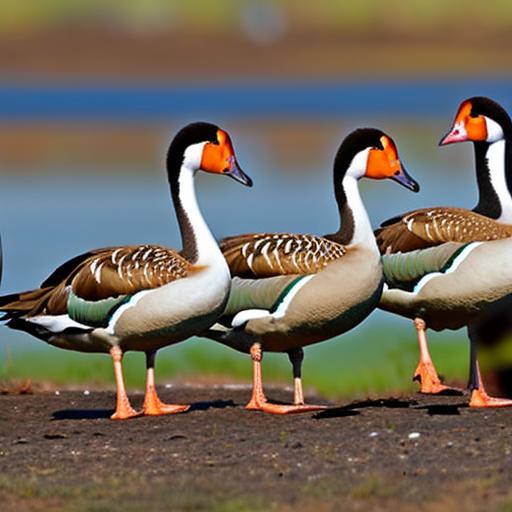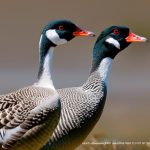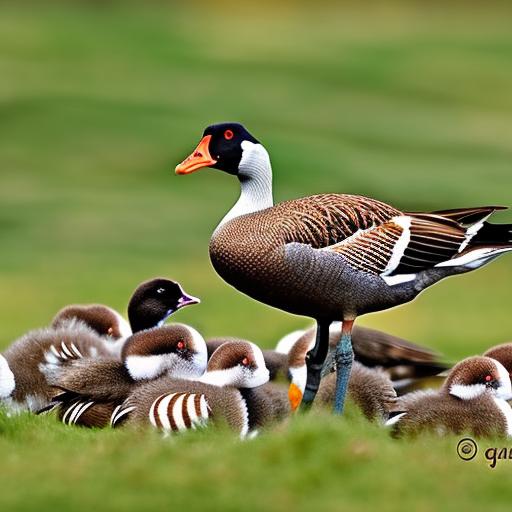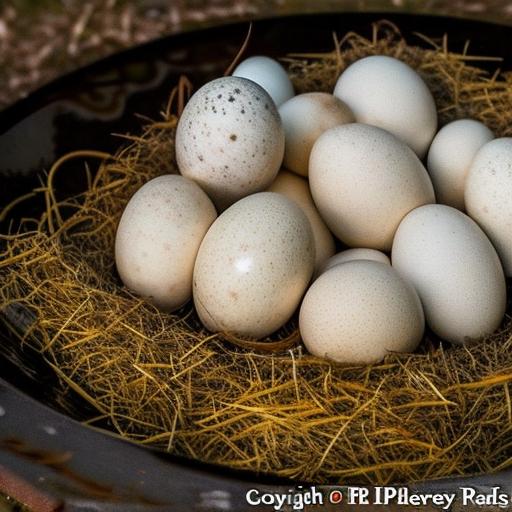African geese are a popular breed of domesticated birds known for their unique characteristics and distinctive honking sounds. They are native to Africa and have been domesticated for centuries. African geese are highly valued for their meat, eggs, and feathers, making them a popular choice for both small-scale farmers and backyard enthusiasts.
Key Takeaways
- African geese are a group of domesticated geese breeds that originated from Africa.
- They are known for their large size, distinctive knob on their beaks, and loud honking calls.
- African geese were first introduced to Europe in the 1700s and have since become popular in many parts of the world.
- There are several types of African geese breeds, including the Chinese African, the Egyptian, and the Sebastopol.
- African geese require a spacious and secure environment, a balanced diet, and regular veterinary care to maintain their health and well-being.
Characteristics of African Geese
African geese are large birds, with males weighing between 12-14 pounds and females weighing between 10-12 pounds. They have a long lifespan, typically living up to 20 years or more with proper care. One of the most notable features of African geese is their long necks, which they use to reach vegetation in shallow water bodies.
Another unique characteristic of African geese is their distinctive honking sounds. They have a loud and deep honk that can be heard from a distance. This honking is not only a form of communication but also serves as a warning signal to other geese in the flock.
History of African Geese Breeds
African geese have a long history that dates back thousands of years. They are believed to have originated in Africa and were later introduced to other parts of the world through trade and migration patterns. These birds were highly valued by ancient civilizations for their meat, eggs, and feathers.
Over time, African geese were domesticated and bred for specific traits such as size, meat quality, and egg production. This selective breeding led to the development of different breeds with distinct characteristics. Today, there are several recognized breeds of African geese, each with its own unique traits and qualities.
Different Types of African Geese Breeds
There are several different breeds of African geese, each with its own distinct characteristics. One of the most common breeds is the Chinese goose, which is known for its large size and excellent meat quality. Chinese geese have a calm and friendly temperament, making them a popular choice for backyard enthusiasts.
Another popular breed is the African Grey goose, which is known for its striking appearance and excellent egg-laying abilities. African Grey geese have a beautiful grey plumage and are highly valued for their large and flavorful eggs. They are also known for their friendly and sociable nature, making them a great addition to any flock.
Physical Appearance of African Geese
African geese have a distinct physical appearance that sets them apart from other breeds. They have a long neck and a sturdy body, with males being slightly larger than females. Their feathers are usually white or grey, although some breeds may have different color variations.
African geese have a strong and curved beak that they use to forage for food in shallow water bodies. Their feet are webbed, which allows them to swim and walk on muddy surfaces with ease. The size and appearance of African geese can vary depending on the breed, with some breeds being larger and more colorful than others.
Temperament and Personality Traits of African Geese

African geese are known for their friendly and sociable nature. They are highly intelligent birds that can form strong bonds with their owners and other animals. African geese are often described as curious and inquisitive, always exploring their surroundings and interacting with their environment.
These birds are also highly protective of their flock and will sound the alarm if they sense any danger. They have a strong instinct to protect their young and will fiercely defend them against any potential threats. Despite their protective nature, African geese can be trained to be gentle and obedient pets with proper socialization and handling.
Ideal Environment for African Geese Breeds
African geese require a suitable living environment to thrive and stay healthy. They need access to water for swimming and foraging, as well as a spacious area to roam and graze. A pond or shallow water body is essential for African geese, as they use their long necks to reach vegetation in the water.
It is important to provide adequate shelter and protection from predators for African geese. A secure and predator-proof enclosure is necessary to keep them safe at night and during adverse weather conditions. Additionally, African geese should have access to fresh food and clean water at all times.
Feeding and Care for African Geese
African geese have specific dietary requirements that need to be met for optimal health and wellbeing. They are herbivores and primarily feed on grass, weeds, and aquatic plants. It is important to provide a balanced diet that includes a variety of greens, grains, and vegetables to ensure they receive all the necessary nutrients.
In addition to their natural diet, African geese can also be supplemented with commercial poultry feed. This feed should be specifically formulated for geese and should contain the necessary vitamins and minerals. Fresh water should always be available for African geese, as they need it for drinking and bathing.
Basic care requirements for African geese include regular grooming, such as trimming their wings and nails. They should also receive regular health checks to ensure they are free from any diseases or parasites. Providing a clean and comfortable living environment is essential for their overall wellbeing.
Breeding and Reproduction of African Geese
African geese are monogamous birds that form strong pair bonds with their mates. They typically breed in the spring or early summer when the weather is favorable. The female will lay a clutch of eggs, usually between 6-12 eggs, which she will incubate for about 28-30 days.
Once the eggs hatch, the parents will care for the goslings until they are old enough to fend for themselves. It is important to provide a safe and secure nesting area for the female to lay her eggs and raise her young. Proper nutrition and care during the breeding season are crucial for the health and survival of the goslings.
Common Health Issues and Diseases in African Geese
African geese are generally hardy birds that are resistant to many common poultry diseases. However, they can still be susceptible to certain health issues if not properly cared for. Some common health issues that can affect African geese include respiratory infections, parasites, and foot problems.
To prevent these health issues, it is important to provide a clean and sanitary living environment for African geese. Regular health checks and vaccinations can also help prevent the spread of diseases. If any health issues arise, it is important to consult a veterinarian who specializes in poultry to ensure proper diagnosis and treatment.
African geese are a popular breed of domesticated birds known for their unique characteristics and valuable qualities. They are large birds with long necks and distinctive honking sounds. African geese have a long history that dates back thousands of years and have been selectively bred for specific traits.
There are several different breeds of African geese, each with its own distinct characteristics and qualities. They have a friendly and sociable temperament, making them great pets or livestock for small-scale farmers and backyard enthusiasts. African geese require a suitable living environment, proper nutrition, and regular care to thrive and stay healthy.
Overall, African geese are fascinating birds that offer both practical benefits and companionship. Whether you are looking for a source of meat, eggs, or feathers, or simply want a unique and sociable pet, African geese are definitely worth considering. With proper care and attention, these birds can provide years of enjoyment and fulfillment.
If you’re interested in learning more about African geese breeds, you might also find this article on how to care for goslings from Poultry Wizard informative. It provides valuable insights and tips on raising healthy and happy goslings. Check it out here. Additionally, Poultry Wizard offers a wealth of resources and information on various poultry topics, including breeding quail and whether or not they sit on their eggs. Explore their website here to expand your knowledge on poultry breeding and care.
FAQs
What are African geese breeds?
African geese breeds are a group of domesticated geese that originated from Africa. They are known for their large size, distinctive knob on their beaks, and their ability to adapt to different environments.
What are the different types of African geese breeds?
There are several types of African geese breeds, including the African Grey, the Brown African, and the Buff African. Each breed has its own unique characteristics and physical features.
What is the average size of African geese breeds?
African geese breeds are known for their large size, with males weighing between 18-22 pounds and females weighing between 14-18 pounds on average.
What is the lifespan of African geese breeds?
African geese breeds can live up to 20 years in captivity with proper care and nutrition.
What is the temperament of African geese breeds?
African geese breeds are generally docile and friendly, making them great pets. However, they can become aggressive during breeding season or when they feel threatened.
What is the diet of African geese breeds?
African geese breeds are herbivores and primarily feed on grass, weeds, and other vegetation. They also enjoy fruits and vegetables as treats.
What is the breeding season for African geese breeds?
African geese breeds typically breed from late winter to early spring, with females laying up to 20 eggs per season.
What is the purpose of African geese breeds?
African geese breeds are primarily kept as pets or for ornamental purposes. They are also used for their meat and eggs in some parts of Africa.
Meet Walter, the feathered-friend fanatic of Florida! Nestled in the sunshine state, Walter struts through life with his feathered companions, clucking his way to happiness. With a coop that’s fancier than a five-star hotel, he’s the Don Juan of the chicken world. When he’s not teaching his hens to do the cha-cha, you’ll find him in a heated debate with his prized rooster, Sir Clucks-a-Lot. Walter’s poultry passion is no yolk; he’s the sunny-side-up guy you never knew you needed in your flock of friends!







